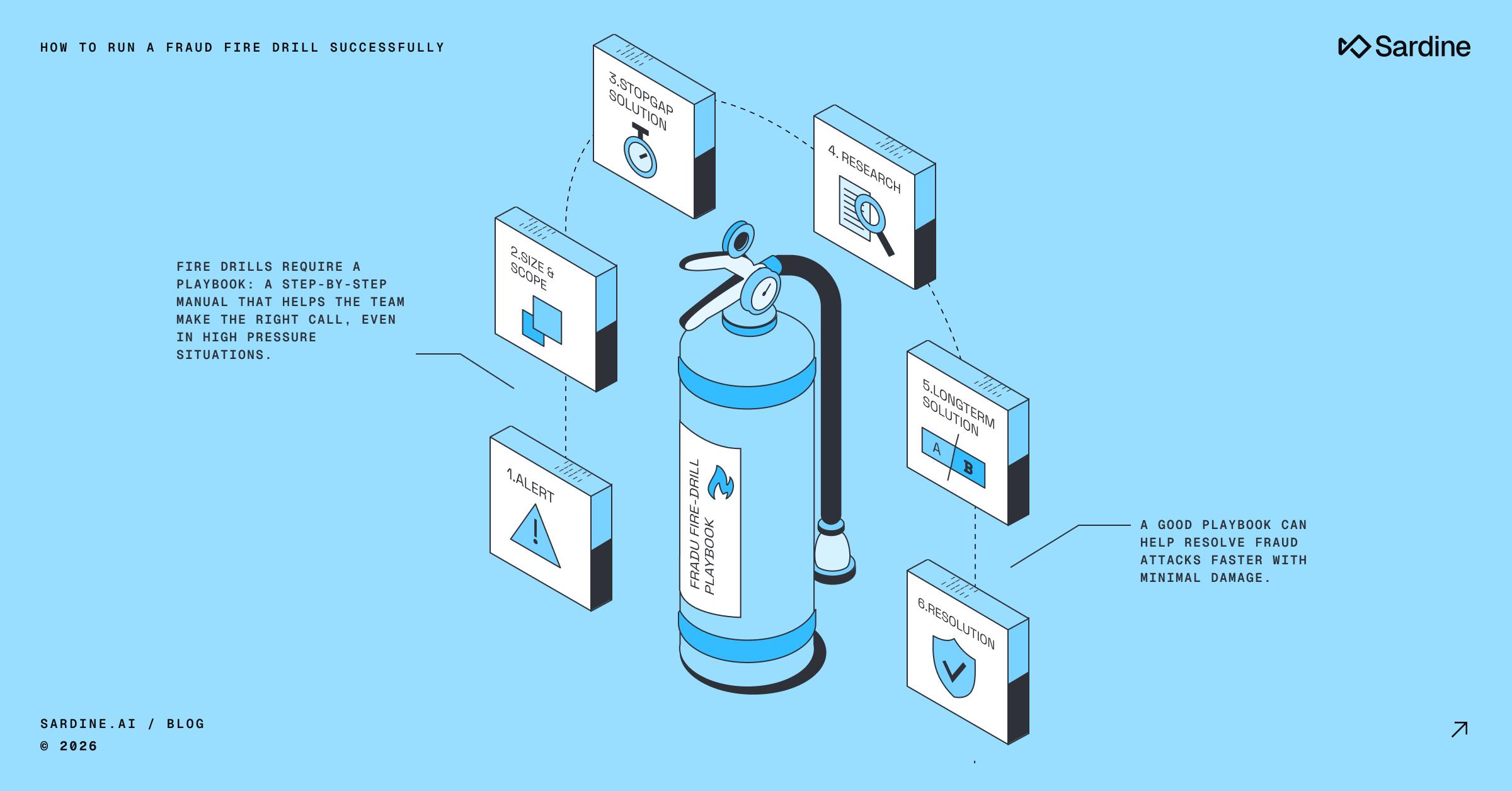My 7 Fraud Predictions for 2024
As we closed out 2023 and look to the future, many trends are accelerating, but one remains constant. Fraud and AML is a cat-and-mouse game, and fraud analytics plays a crucial role in enhancing fraud detection and prevention mechanisms. Many of the scams are as old as money itself, but the tools and techniques have upgraded.
This was the year of Generative AI, and countless conference panels that talked about GenAI. As a data scientist, this is a subject near and dear to my heart, and I’ve written about how fraudsters are already using it for scams and deep fakes, but also how we’re using it to make our customers 10x more efficient.
Another constant? The fraud squad’s trilemma.
- Increased fraud cases
- Pressure to reduce head count and manual work
- The pressing need for better performance from AI and rules engines
I’ve been reflecting on the emerging trends and the pivot points that await us. That’s precisely why we built Sardine: to limit manual review, empower you with a simple yet powerful rules engine, and provide AI and machine learning stay a leap ahead.
With these challenges in mind, let’s dive into my 7 key predictions for 2024 in the world of fraud prevention.
1. A Regulatory Clampdown on Scams
The FBI reported scams and identity theft losses exploded to $10.3 billion in 2022, from $6.9 billion the year before. A crucial aspect of combating these issues is the implementation of a Customer Identification Program (CIP), which is mandated by the Patriot Act to verify the identity of individuals conducting financial transactions. Regulation E (Reg E) does not allow a consumer to be refunded if they authorized a transaction, even under false pretenses. With scams consistently hitting the headlines, there will be a clamor for more robust regulations. While the Federal Trade Commission is focused on communication platforms, expect the financial regulators to focus on the financial institutions too.
These losses will move from the consumer to financial institutions, especially those with more lax fraud controls on their non-card payment types.
Real-Time Payments Demand Real-Time Fraud Prevention
The advent of real-time payment systems like UPI, PIX, and FedNow has transformed financial transactions, but not without its share of challenges. A robust fraud detection system is essential for analyzing behavioral, device, and transactional data to prevent and detect financial fraud in real-time payments. Real-time payments are irreversible, and introducing real-time payment systems can create a corresponding rise in scams.
We’ve seen this already in the UK, where Real-Time Payments have been live since 2005, and Authorized Push Payment Fraud is now the #1 type of fraud experienced by consumers. The Payment Services Regulator (PSR) has announced a new liability scheme that will come into force in October 2024 that requires the sending and receiving institutions to refund reported scams and share any losses reported by the consumer 50/50.
What is still a gap is what role do non-financial organizations such as social media platforms like Twitter, Instagram or WhatsApp have to play in faster payment scams, since many of these scams originate from these platforms.
My take is that non-financial organizations are increasingly made accountable for these scams in the future. While there is no legal precedent yet as we await moves by the FTC, this may change as victims begin to demand action through the courts. This is similar to how telecoms have increasingly been sued by victims of SIM swap attacks. Change often takes time and we are increasingly living in a complex interconnected world where non-financial institutions originate a lot of the financial fraud and scams, and so far have had no incentive to stop them.
Similarly, in the US, the top banks decided to begin refunding Zelle scam victims, which is very laudable. However, fraudsters always know how to game any system and we predict we’ll see more friendly Zelle scams, where someone falsely claims they didn’t make a payment, to try and get reimbursement from the banks. The problem with re-imbursing victims is it becomes another game for fraudsters to play. It helps the victim but doesn’t solve the issue.
3. KYC Becomes Retail's New Norm
High-value goods have always attracted high-stakes fraud. Retailers will likely mandate KYC processes at checkout to combat this, particularly curbside fraud, by 2024. Introducing robust KYC processes is crucial in preventing credit card fraud during high-value transactions. KYC processes always add friction that can harm conversion, but often if someone is willing to pay a high dollar value for an item, they’re also willing to go through a little more friction to ensure they receive it!
Expect to see customers showing IDs that match their purchase details at pickup—a small step for consumers, a giant leap for fraud prevention.
Digital Growing Pains for Traditional businesses leveraging predictive analytics
As more traditional businesses stretch their wings into the digital realm, they become prime targets for fraudsters. If, as an organization, you historically took orders over the phone or in person, the shift to digital can be dramatic. Many companies faced this during the pandemic and discovered it also increased sales.
However, it also made them vulnerable to online fraud and crime vectors. Fraudulent transactions can have a significant impact on these businesses, leading to financial damage and reputational harm. These companies lack the decades of experience operating digitally that e-commerce or digitally native businesses have. They’re vulnerable to classic attacks like business email compromise (BEC) and fake invoice scams.
As this high-value commerce moves online, the cost of an account takeover is asymmetrically high. This is where we see a lot of parallels with digital goods, because these two industries – digital goods and high-value commerce – share one thing in common, that the cost of missing flagging a fraud case is just so brutally high, that the stakes for getting fraud right are also very high.
This is where banks and companies serving SMBs in the local community can begin to differentiate themselves. We’re seeing the smartest community bank clients begin to repackage Sardine’s capabilities in their marketing and go-to-market strategies to build a sense of trust and confidence for their clients entering the digital world.
5. The Shift Away from Guest Checkouts
In the coming year, most retailers should consider whether the guest checkout option is worth the hassle. Its convenience is clear, but so is the fraud risk it invites. It is crucial to distinguish legitimate transactions from fraudulent ones to ensure a secure shopping experience. Guest checkouts remove the friction for first-time users but also mean an e-commerce platform or marketplace has no data about that customer (unlike registered users). Most likely, there’s a balance to be made, where the first checkout is as a guest checkout, however, the next ones have to be done via an account.
Passive detection will be the game-changer; analyzing user behavior, device usage and other available data without adding friction to the customer experience means guest checkouts can still work with less fraud.
6. E-Commerce consolidates bot detection with fraud detection
E-commerce platforms and marketplaces often have bi-furcated cyber security risks to before the transaction and during. Before the transaction, the focus is on bots and the use of painful processes like reCAPTCHA, while during the transaction, it focuses on card or other fraud vectors.
Ensuring data quality is crucial in fraud detection as it helps maintain the accuracy and reliability of data sets for descriptive analytics, predictive analytics, and fraud data analytics.
At Sardine, we’ve always done both. This has the benefit of consolidating vendors, but more importantly, data. With more data about a user before, during, and after a transaction, we can reduce false positives and catch more fishy activity.
7. Banking as a Service Faces the Music
The recent uptick in enforcement actions against banks with fintech partnerships sends a clear message: compliance can’t be an afterthought. Machine learning models play a crucial role in monitoring and preventing fraud in these partnerships by analyzing financial data to create risk scores for transactions. Banks that operate this way have faced much more supervision and enforcement action from regulators.
As BaaS platforms come under the magnifying glass, companies will need real-time oversight of their fintech partners, a way to collaborate on fraud and AML cases securely and to be able to demonstrate they have control of 3rd party risks. Sardine stands ready to offer this oversight, ensuring that compliance is as real-time as the transactions themselves.
2024 is here.
What are your predictions? Where do you see the industry heading, and how are you preparing to meet these challenges head-on? Share your thoughts, and let's tackle the future together.
Interested in learning more about Sardine's solutions? Let's talk about how we can help solve your trilemma for 2024 and beyond.



%20(1).png)








